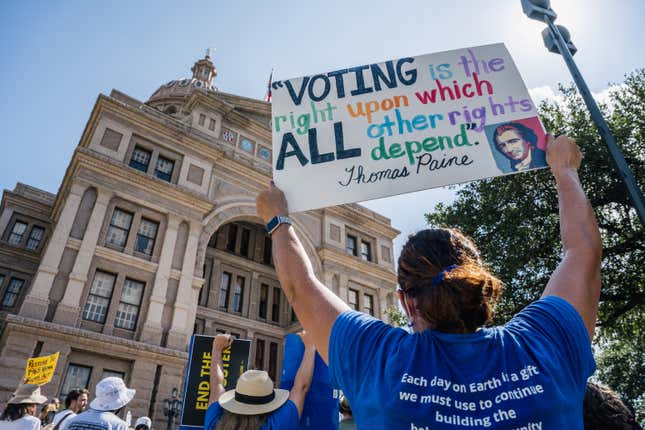
The House of Representatives passed the John Lewis Voting Rights Advancement Act on Tuesday, with a 219-212 vote. According to CBS News, the legislation passed along party lines and is headed to the Senate for a tough fight with GOP lawmakers led by Minority Leader Mitch McConnell.
The bill—named after Democratic Georgia U.S. Rep. John Lewis who passed away last July—mandates that certain jurisdictions with a history of racist discriminatory voting practices would require approval of any changes to voting laws from the Justice Department. This is meant to restore a provision of the 1965 Voting Rights Act that was stricken by the Supreme Court decision of Shelby County v. Holder in 2013. This is the second key voting rights bill, along with the For the People Act, that Dems are attempting to pass to counter the numerous restrictive voting bills that have been passed in GOP-led states.
The Senate is currently evenly divided, so Democrats would need all 50 Democrats and at least 10 Republicans to get the bill to President Biden’s desk.
From CBS:
Lewis’ death last year was seen as a call by many Democrats to honor the memory of the civil rights icon and work to pass comprehensive voting rights legislation, and his death inspired some to endorse eliminating the filibuster to allow these measures to be approved by a simple majority. Such a move has been staunchly opposed by more moderate Democrats, such as Senator Joe Manchin of West Virginia.
Since former President Donald Trump lost his bid for reelection in November, several Republican-led states have sought to pass legislation limiting voting access. Advocates of such bills argue that they are necessary to counter voter irregularities – although no significant voter irregularities were reported in the 2020 election.
According to NPR, Republicans against the bill say that it gives the federal government too much power over the states’ election processes. Republicans have already blocked another bill, the For the People Act, back in June. The Root covered what went wrong when that proposed legislation reached the Senate. The bill set mandates for redistricting, voting by mail, absentee ballots and campaign financing. It also sought to make it easier for citizens to vote with same-day registration, online registration, and automatic registration at government agencies including the DMV and universities.
NPR reports that voting rights advocates believe both bills need to be passed to secure the right to vote for all Americans. The Senate returns to D.C. in September, and Senate Majority Leader Chuck Schumer has already said they’ll be looking at voting rights legislation.

